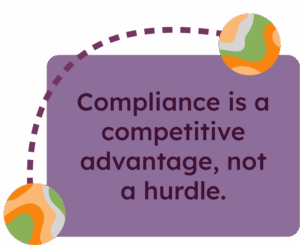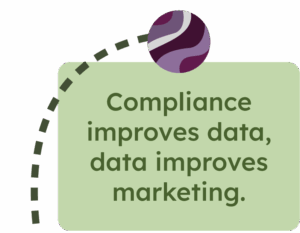Healthcare marketing teams often find themselves in a seemingly impossible position. Leadership demands growth, patients expect better experiences, and meanwhile, compliance requirements seem to change every few months. HIPAA updates, state privacy laws, research ethics standards, and payer reporting requirements create a maze of restrictions that can make even basic marketing activities feel risky.
The natural response is to play it safe. Marketing campaigns get watered down to avoid any potential compliance issues. Patient feedback collection gets limited to basic surveys that reveal little actionable insight. Growth strategies become conservative by necessity, focused more on what won’t get the organization in trouble than on what might actually work.
 But this defensive mindset misses the bigger picture. Sure, compliance keeps you out of trouble, but that’s just the baseline. The real opportunity comes when you approach regulations strategically rather than grudgingly. Done right, working within regulatory frameworks can actually make your marketing more effective and build stronger patient trust than traditional promotional tactics ever could.
But this defensive mindset misses the bigger picture. Sure, compliance keeps you out of trouble, but that’s just the baseline. The real opportunity comes when you approach regulations strategically rather than grudgingly. Done right, working within regulatory frameworks can actually make your marketing more effective and build stronger patient trust than traditional promotional tactics ever could.
The key difference is seeing compliance as a competitive advantage rather than just a hurdle to clear.
When Compliance Constrains
Most healthcare organizations treat compliance as a constraint on growth rather than a component of it. Marketing teams operate under the assumption that following regulations means accepting limitations on their ability to reach and engage patients effectively. This mindset creates several unintended consequences.
First, it leads to generic, risk-averse messaging that fails to differentiate the organization or address specific patient needs. When teams are primarily focused on what they can’t say or do, their marketing becomes bland and ineffective. Patients receive generic communications that could have come from any healthcare provider, reducing the impact of marketing investments.
Second, compliance avoidance often means missing opportunities to collect valuable patient feedback and data. Organizations limit their survey and feedback collection efforts to avoid potential privacy issues, which means they operate with less insight into patient experiences and preferences. This creates a cycle where marketing becomes less effective because teams lack the data needed to understand what actually resonates with patients.
Finally, treating compliance as purely restrictive prevents organizations from recognizing how regulatory frameworks can actually enhance patient trust and engagement when implemented strategically.
 How to Turn Compliance into a Competitive Advantage
How to Turn Compliance into a Competitive Advantage
Healthcare organizations that excel at growth while maintaining strong compliance records don’t just follow regulations. They use regulatory frameworks as a foundation for building deeper patient trust and more effective marketing strategies.
Consider how HIPAA compliance, when implemented thoughtfully, can actually strengthen patient relationships. Instead of viewing privacy protections as barriers to patient engagement, successful organizations use them as proof points for their commitment to patient safety and respect. They communicate transparently about how they protect patient information and why these protections matter, turning regulatory compliance into a differentiating message about organizational values.
The same principle applies to research ethics standards and informed consent processes. Organizations that excel in these areas don’t hide their compliance efforts. They highlight them as evidence of their commitment to patient autonomy and ethical practice. This transparency builds trust that purely promotional messaging cannot achieve.
When patients see that an organization takes compliance seriously, they’re more likely to provide honest feedback, participate in quality improvement initiatives, and recommend the organization to others. Compliance becomes a trust-building tool rather than just a risk mitigation strategy.
The Data Quality Connection
 One of the most overlooked benefits of strong compliance practices is their improvement of data quality, which, in turn, enhances marketing effectiveness. Organizations with robust compliance frameworks tend to have better data governance, more accurate patient information, and more reliable feedback collection processes.
One of the most overlooked benefits of strong compliance practices is their improvement of data quality, which, in turn, enhances marketing effectiveness. Organizations with robust compliance frameworks tend to have better data governance, more accurate patient information, and more reliable feedback collection processes.
HIPAA-compliant data collection methods often produce higher-quality insights because they’re designed with patient privacy and consent in mind from the beginning. Patients are more likely to provide accurate, detailed feedback when they trust that their information will be handled appropriately. This creates a virtuous cycle where better compliance leads to better data, which enables more effective marketing strategies.
Research ethics frameworks serve a similar function. Organizations that follow rigorous informed consent processes often see higher survey response rates and more thoughtful patient feedback because participants understand how their input will be used and feel respected in the process.
 The Integration Challenge
The Integration Challenge
The biggest obstacle to leveraging compliance as a growth driver is organizational fragmentation. In most healthcare organizations, compliance functions operate separately from marketing teams, creating silos that prevent strategic integration.
Compliance officers focus on risk mitigation and regulatory adherence without considering how their work could support growth objectives. Marketing teams develop strategies without fully understanding how compliance frameworks could strengthen their patient engagement efforts. Quality improvement teams collect patient feedback but don’t share insights that could inform marketing strategies.
This separation means that compliance becomes purely defensive rather than strategic. Organizations invest significant resources in regulatory adherence without capturing the trust-building and data quality benefits that strong compliance can provide.
Technology’s Role in Compliance-Driven Growth
Today, healthcare organizations have access to platforms that can integrate compliance requirements with marketing and patient engagement functions. The most effective solutions don’t just help organizations avoid compliance problems. They help organizations leverage compliance frameworks to build stronger patient relationships and collect better data for marketing decisions.
These platforms typically include built-in safeguards for HIPAA, FERPA, and other relevant regulations, allowing marketing teams to engage patients and collect feedback without constantly worrying about compliance issues. They automate many compliance processes, reducing the administrative burden while ensuring that regulatory requirements are consistently met.
The Long-Term Advantage
Healthcare organizations that master the integration of compliance with growth strategy create sustainable competitive advantages that are difficult for competitors to replicate. Their marketing becomes more authentic because it’s grounded in genuine organizational commitments to patient safety and privacy. Patient data becomes more reliable because it’s collected through trusted, compliant processes. Their patient relationships become stronger because they’re built on demonstrated respect for patient rights and autonomy.
Perhaps most importantly, these organizations become more resilient as regulatory requirements evolve. Instead of scrambling to adjust their marketing strategies when new regulations emerge, they have frameworks in place that can adapt to changing requirements without disrupting their growth efforts.
Moving Forward
The healthcare organizations that will win in the next few years aren’t going to be the ones playing compliance limbo—trying to squeeze under every rule. They’ll be the ones who figured out how to use those rules as their competitive edge, building real patient trust and driving growth at the same time.
This isn’t a quick fix. You need teams that actually work together, tech systems that talk to each other, and ways to measure whether patients trust you. But if you’re a healthcare leader ready to stop seeing compliance as the enemy, the payoff is huge: marketing that feels authentic, works better, and actually lasts.











